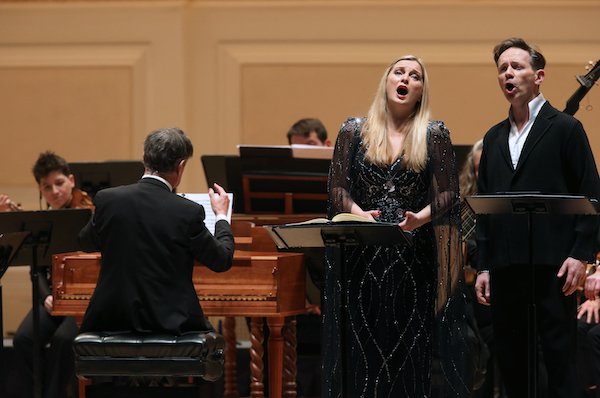Crowe, Davies lead English Concert’s rarefied “Rodelinda”

George Frideric Handel’s ability to express character, dramatic situations and transformation through music has been equalled since the mid-18th century, but never surpassed. And the sheer beauty of his vocal music, and the astonishing quantity of it, are marks of his unique genius.
Yet in a sign of the unfortunate narrowness of opera in New York City, the only reliable way to experience a Handel opera performance is to wait for one of the regular Carnegie Hall visits of The English Concert, conductor Harry Bicket, and some of the finest singers in classical music. The latest event was Sunday afternoon, when the group delivered a fabulous performance of Rodelinda
The story of this 1725 opera, from one of Nicola Haym’s exemplary librettos, is of the titular queen of Lombardy. She believes her husband the king, Bertarido, is dead, and his rival Grimoaldo is trying to force her to marry him. Bertarido is still alive and hiding, and with the help of faithful aide Unoklfio reunites with Rodelinda and returns to the throne. Quite a lot of plot happens in between—flirting, revenge, characters figuring out if they’re good guys or bad ones—meaning quite a lot of spectacular singing from soprano Lucy Crowe as Rodelinda and countertenor Iestyn Davies as Bertarido.
Davies was also paired with another countertenor, Aryeh Nussbaum Cohen, as Unulfo, and tenor Eric Ferring was Grimoaldo. Eduige, Bertarido’s sister who is heavily involved in the intrigues, was sung by mezzo-soprano Christine Rice. Last but not least, bass-baritone Brandon Cedel was Garibaldo, conniving counselor to Grimoaldo.
This is Handel, so the vocal music is technically demanding, not for its own sake but because things like rapid trills and 16th-note articulation are his means to give physical life to the thoughts and emotions of the characters. And they are beautiful to hear. In this basic sense, the singing was virtuosic, but the delights of technique were, rightly, ornamental to the powerful loveliness and expression in all the singing.
Crowe and Davies led the way. The two are among the finest Handel singers on the scene, each with a gorgeous sound and great artistry. Thought the details of Handel’s writing are not far from bel canto style, the two approached the music with a fundamental simplicity.
As thrilling as it was to hear the acrobatics, it was even more deeply satisfying to hear Crowe expand her sound from pinpoint to broad and resonant in her opening aria, “Ho perduto il caro sposo.” Her measured and focused dynamics were the most expressive parts of the entire concert, heavy with the sense that there was something profound that needed to be said with increasing force, or resignation. Her singing was thought through in detail, as she showed in her “Ombre, piante” duet with flutist Rosemary Bowker, modulating her sound to match the instrument while Bowker modeled Crowe’s tempo and rhythms. That was the most spellbinding moment of the afternoon, and there were no weak moments.
Davies sang the famous “Dove sei” with the same artful simplicity. His combination of open, unadorned sound brought out both the beauty in the vocal line and the emptiness and sorrow of the character. Davies was also wonderful and responsive paired with other singers. The tricky pairing of two countertenors came off superbly—Cohen has an uncanny mezzo color to his voice, and there was a clear separation between his youthful sound and Davies more mature, yet still silky, tone.
Ferring and Rice were warm and energetic from the very start—Rice had a few fine comic moments—but did take some time to fully open up their sound and agility. When they did, they were as gripping as the rest—Ferring sang “Tra sospetti” with fantastically clear and smooth articulation, bringing out both the intensity and the feeling he was having fun, and Rice’s “Quanto più fiera” was lively and graceful. Rice has a lighter mezzo sound which was an excellent mix with Crowe’s rich soprano and a contrast to Cohen’s darker quality.
Likewise, Cedel was far more bass than baritone. With a weighty sound and color, he had the prototypical operatic villain voice, and it was marvelous to hear him lope through “Tirannia gli diede il regno” with precise and quick vocal footwork. As with all the singing, his mastery of the difficulties meant one heard the character’s scheming anger.
Bicket’s direction and the ensemble’s playing were as expert as always. One almost takes for granted how everything from The English Concert will have tempos that feel perfect, lively and unexaggerated rhythms, excellent spirit. The group’s sound is a blend of exact ensemble intonation and various timbres and colors that are emulsified into one overall texture. There are a lot of period instrument ensembles out there with widely varied ensemble qualities, but no one sounds as organic and yet individual as The English Concert. And no one plays Handel like this.
The Met Orchestra Chamber Ensemble and mezzo-soprano Isobel Leonard perform Chausson, Beach, Akiho, James Lee III, and Tamusuza, in Weill Recital Hall 7:30 p.m. Monday. carnegiehall.org
Posted Dec 11, 2023 at 7:43 pm by Karen Krueger
It’s satisfying to read a review of a performance of Handel from someone who truly appreciates the composer’s unique genius, as well as the superb artistry of these particular performers.
Three and a half hours seemed a short time to spend in musical paradise. Thank-you to Harry Bickett for bringing us these annual delights.
Posted Dec 20, 2023 at 1:14 pm by Elliot Schnapp
We attend the English Concert’s Carnegie appearance and are never disappointed. This was perhaps their finest performance yet, with an extraordinary virtuosic and balanced case of singers. The orchestral playing was, as always, incredibly precise while never less than beautiful. Special shout out to the theorbo player, beautiful to hear and great fun to watch.